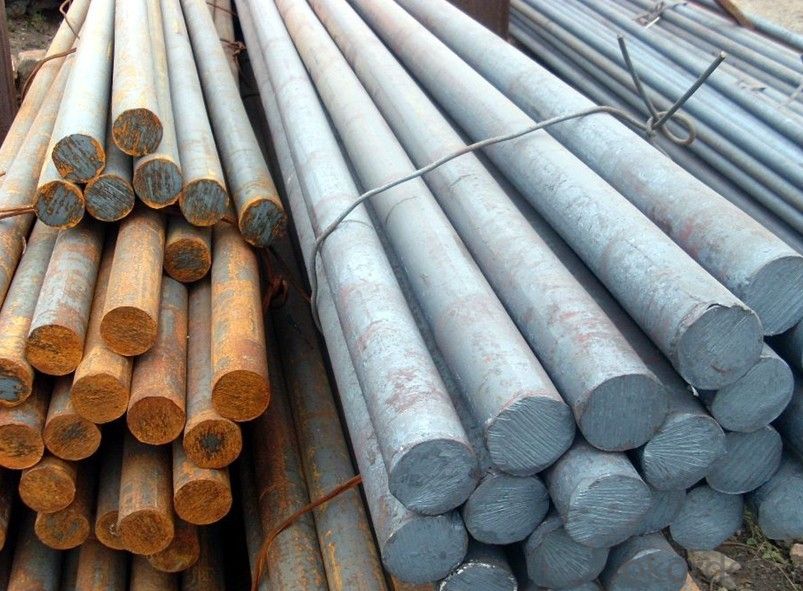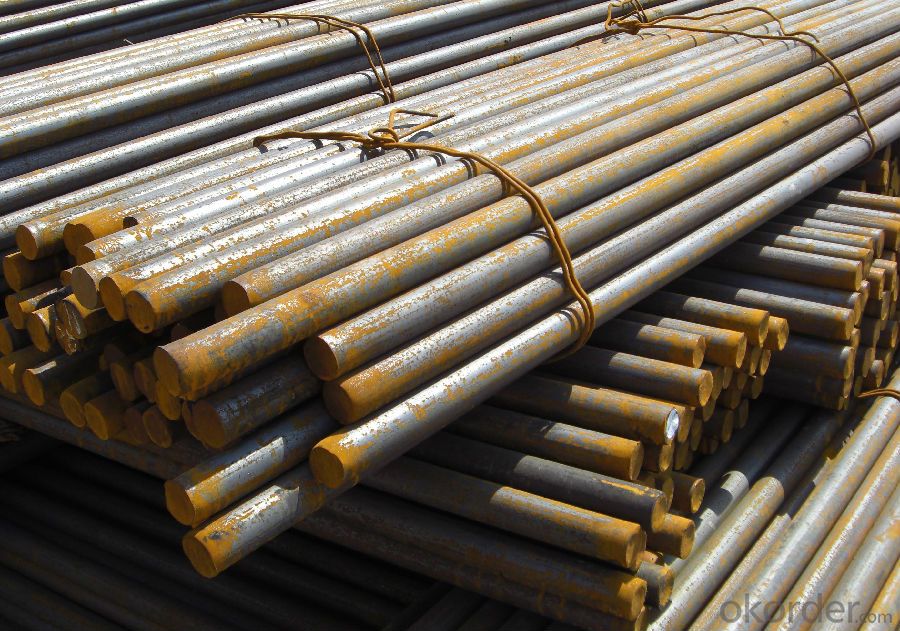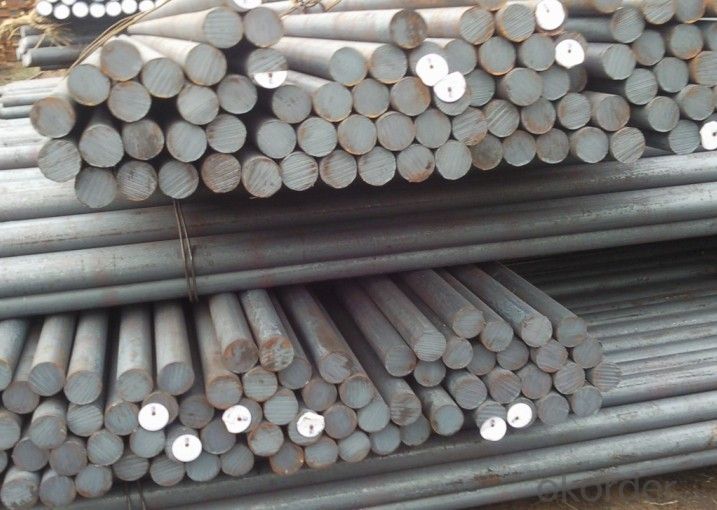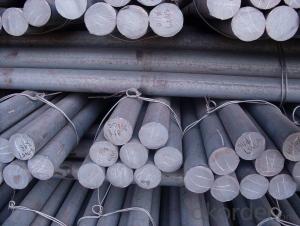Hot sell round steel bar for construction
- Loading Port:
- Tianjin
- Payment Terms:
- TT OR LC
- Min Order Qty:
- 25000 m.t.
- Supply Capability:
- 10000 m.t./month
OKorder Service Pledge
OKorder Financial Service
You Might Also Like
Specifications of Common Steel Round Bar
1. Grade: 304, 316L, 321
2. Type: Mild carbon steel
3. Shape: Round bar, solid bar of steel with circular section
4. Diameter: 8mm-150mm
5. HS Code: 72283010
Usage and Applications of Common Steel Round Bar
1. Common Steel Round Bar of 8-25mm, or small round is mostly used for straight bundles supply, and used for steel, bolts and various mechanical parts. While the bigger round bar, or more than 25mm hot rolled bar, is mainly for the manufacture of mechanical parts or for seamless steel billet.
2. Steel round bar is used in construction and a large number of architectural and engineering structures.
3. Besides, we can supply some especial material steel round bar that can be used for main shaft of steamer, hummer shank, with big section and supper force.
Packaging & Delivery of High Quality Round Bar
Packaging Detail: All goods are packed in bundle with steel strips and shipped by break bulk vessel or container (depend on target market and different ports)
Delivery Detail: 45 days
Trade terms: FOB, CFR, CIF
MOQ: 25 tons per specification; we can negotiate the quantity if the specification is normal or we have stock of one specification.
Weight: The price invoicing on theoretical weight basis or actual weight basis depends on customer’s request.
Shipment: The shipment of bulk break or container is depends on customer’s request and the situation of the port of destination.
Documents given: Full set of original clean on board bill of lading; Original signed commercial invoice; Original packing list; Policy of insurance; Certificate of origin and what the target market needs.
Production Flow of High Quality Round Bar
The common processes are preheated forging quenching, dual refinement solution process, cooling quenching and isothermal quenching. We use heat treatment for dual refinement solution process. The main measures process is high temperature solution and refinement cycle. High temperature solution can improve the carbide morphology and particle size. The aim is to make the loop refinement ultrafine austenite grains.



- Q:What is the maximum length of a steel round bar that can be manufactured?
- The maximum length of a steel round bar that can be manufactured is dependent on various factors such as the manufacturing capabilities, equipment, and transportation limitations. However, in general, steel round bars can be manufactured in lengths ranging from a few meters to up to 12 meters or more.
- Q:What are the typical hardness values for different grades of steel round bars?
- The hardness values of steel round bars can differ depending on the grade and manufacturing process. However, there are some general hardness values that can serve as a reference. For low carbon or mild steel round bars, the typical hardness values range from approximately 120 to 250 Brinell Hardness (HB). These grades of steel are known for their relatively low strength and hardness, but they can be easily machined and welded. Medium carbon steel round bars, commonly used in applications requiring higher strength and hardness, typically have hardness values ranging from about 200 to 400 HB. These grades of steel are often utilized in construction, automotive, and machinery industries. High carbon or alloy steel round bars, which offer even greater strength and hardness, can have hardness values ranging from 400 to 700 HB or even higher. These grades of steel are commonly applied in applications that demand high wear resistance, like cutting tools, gears, and bearings. It is important to acknowledge that these hardness values are approximate and can vary based on factors such as heat treatment, alloy composition, and the specific manufacturing process used. Therefore, it is always advisable to consult the manufacturer's specifications or perform hardness testing to determine the precise hardness values for a particular grade of steel round bar.
- Q:How do you prevent steel round bars from rusting during transportation?
- There are several effective measures that can be taken to prevent rusting of steel round bars during transportation. Firstly, it is crucial to properly package the steel round bars. This involves securely wrapping and sealing them using moisture-resistant materials like plastic or shrink wrap. This packaging will act as a barrier against moisture and prevent direct contact with air. Secondly, the inclusion of desiccants inside the packaging can help absorb any moisture that may be present. Desiccants such as silica gel packets or moisture-absorbing clay will create a dry environment around the steel bars, reducing the chances of rust formation. Another effective method is to use VCI (Volatile Corrosion Inhibitor) packaging. VCI materials release a protective vapor that forms a thin layer on the steel surface, inhibiting corrosion. VCI films or papers can be utilized to wrap the steel round bars, providing long-lasting rust protection. Proper storage conditions are also crucial during transportation. The steel round bars should be stored in a dry and well-ventilated environment, away from rain, humidity, and extreme temperature fluctuations. If possible, they should be stored in a covered and climate-controlled area to minimize the risk of rust formation. Regular inspection and maintenance of the steel round bars during transportation is essential. This ensures that the packaging remains intact and no moisture has seeped in. If any damage or signs of moisture are detected, immediate action should be taken to rectify the issue and prevent rust from spreading. By implementing these preventive measures, the risk of rust formation on steel round bars during transportation can be significantly reduced, guaranteeing that they arrive at their destination in optimal condition.
- Q:How do steel round bars compare to other materials in terms of strength?
- Steel round bars are known for their exceptional strength, making them highly desirable in various industries. When compared to other materials, steel round bars often outperform alternative options in terms of strength. This is mainly due to the unique properties of steel, such as its high tensile strength and toughness. In comparison to materials like aluminum or plastic, steel round bars offer superior strength and durability. Steel has a much higher tensile strength, which means it can withstand greater amounts of tension without deforming or breaking. This attribute makes steel round bars ideal for applications that require structural support or load-bearing capabilities. Furthermore, steel round bars exhibit excellent resistance to bending, shearing, and impact. This resilience allows them to withstand heavy loads, vibrations, and external forces, making them suitable for use in construction, automotive, and manufacturing industries. Steel's high strength-to-weight ratio also makes it an advantageous choice in applications where weight is a crucial factor, such as aerospace or transportation. Moreover, steel round bars can be engineered to possess specific properties, such as heat resistance or corrosion resistance, further enhancing their strength and versatility. By alloying steel with elements like chromium or nickel, it can attain resistance to rust, oxidation, and other forms of deterioration, extending its lifespan and maintaining its strength over time. In summary, steel round bars excel in terms of strength when compared to other materials. Their exceptional tensile strength, toughness, resistance to bending and impact, and ability to be tailored for specific applications make them a preferred choice in numerous industries.
- Q:Can steel round bars be used for pump shaft applications?
- Indeed, pump shaft applications can make effective use of steel round bars. The prevalence of steel round bars in pump shafts can be attributed to their exceptional strength, durability, and resistance against corrosion. Considering the high torsional loads pump shafts face and the necessity to endure the strains of rotating machinery, steel round bars provide the essential mechanical attributes to withstand these circumstances, rendering them an apt selection for pump shaft applications. Moreover, the adaptability of steel permits diverse heat treatments and surface finishes to amplify its efficiency and longevity in pump shafts.
- Q:What are the different types of steel round bars used in the automotive drivetrain systems?
- There are several types of steel round bars commonly used in automotive drivetrain systems, including alloy steel, carbon steel, and stainless steel. These bars are chosen based on their specific properties and characteristics, such as strength, durability, and resistance to corrosion. The selection of the type of steel round bar depends on the specific application and requirements of the drivetrain system.
- Q:Excuse me and steel disc round what is the difference?
- Wire rod refers to the hot-rolled steel bar of 5-22mm diameter or the special-shaped steel of this section. As a result of wire rod delivery, it is also known as wire rod.
- Q:How do you check the quality of a steel round bar?
- Several factors need to be taken into account when checking the quality of a steel round bar. Firstly, it is crucial to assess the dimensions of the bar. This involves measuring its diameter, length, and straightness. Any deviation from the specified dimensions could indicate a lower quality bar. Next, it is important to inspect the surface condition of the steel round bar. It should be free from visible defects such as cracks, pits, or surface irregularities. Additionally, the surface should be smooth and without significant roughness or burrs. Moreover, the chemical composition of the steel round bar must be examined. This can be done through spectroscopic analysis or other testing methods. The composition should meet the required standards and specifications, as any deviations can impact the bar's strength and durability. Another crucial aspect to consider is the mechanical properties of the steel round bar. This involves testing its tensile strength, yield strength, and elongation. Specialized machines can be used for these tests to ensure that the bar meets the necessary strength requirements. Additionally, non-destructive testing methods such as ultrasonic testing or magnetic particle inspection can be employed to identify any internal or surface defects that may affect the bar's quality. Furthermore, it is essential to verify the bar's compliance with industry standards and certifications. This includes checking if the steel round bar meets the specifications set by organizations like ASTM International or ISO. Lastly, consulting reputable suppliers or manufacturers with a proven track record in producing high-quality steel round bars is advisable. They can provide documentation, certifications, and test reports to validate the quality of their products. To summarize, evaluating the dimensions, surface condition, chemical composition, mechanical properties, compliance with standards, and supplier's reputation are key steps in checking the quality of a steel round bar. By thoroughly examining these factors, one can ensure the reliability and performance of the steel round bar for its intended applications.
- Q:Can steel round bars be used in the manufacturing of cylinders?
- Yes, steel round bars can be used in the manufacturing of cylinders. Steel round bars are often used as raw material for manufacturing cylinders due to their high strength, durability, and ability to withstand high pressure and temperature conditions.
- Q:What are the advantages of using nickel-molybdenum-chromium alloy steel round bars?
- There are several advantages of using nickel-molybdenum-chromium alloy steel round bars. Firstly, this alloy steel provides excellent corrosion resistance. The addition of nickel and chromium enhances the steel's resistance to oxidation and various corrosive environments, making it ideal for applications where exposure to moisture or chemicals is a concern. Secondly, the inclusion of molybdenum in the alloy enhances its strength and toughness. This makes the nickel-molybdenum-chromium alloy steel round bars suitable for high-stress applications, such as in the construction of heavy machinery or structures that require durability and resistance to wear and tear. Additionally, this alloy steel offers excellent heat resistance. It can withstand high temperatures without losing its structural integrity, making it suitable for applications involving extreme heat, such as in the aerospace or power generation industries. Moreover, nickel-molybdenum-chromium alloy steel round bars have good weldability, allowing for ease of fabrication and versatility in various manufacturing processes. This makes it a preferred choice for engineers and manufacturers who require a material that can be easily formed or joined to create complex shapes or structures. Lastly, the nickel content in this alloy steel provides excellent resistance to cracking and brittleness, making it highly reliable and long-lasting. This ensures that the round bars will maintain their strength and structural integrity over a prolonged period of time, reducing the risk of failure or breakage in critical applications. Overall, the advantages of using nickel-molybdenum-chromium alloy steel round bars include enhanced corrosion resistance, improved strength and toughness, excellent heat resistance, good weldability, and high reliability. These qualities make this alloy steel a preferred choice for a wide range of applications in industries such as construction, manufacturing, and aerospace.
1. Manufacturer Overview |
|
|---|---|
| Location | |
| Year Established | |
| Annual Output Value | |
| Main Markets | |
| Company Certifications | |
2. Manufacturer Certificates |
|
|---|---|
| a) Certification Name | |
| Range | |
| Reference | |
| Validity Period | |
3. Manufacturer Capability |
|
|---|---|
| a)Trade Capacity | |
| Nearest Port | |
| Export Percentage | |
| No.of Employees in Trade Department | |
| Language Spoken: | |
| b)Factory Information | |
| Factory Size: | |
| No. of Production Lines | |
| Contract Manufacturing | |
| Product Price Range | |
Send your message to us
Hot sell round steel bar for construction
- Loading Port:
- Tianjin
- Payment Terms:
- TT OR LC
- Min Order Qty:
- 25000 m.t.
- Supply Capability:
- 10000 m.t./month
OKorder Service Pledge
OKorder Financial Service
Similar products
New products
Hot products
Related keywords































